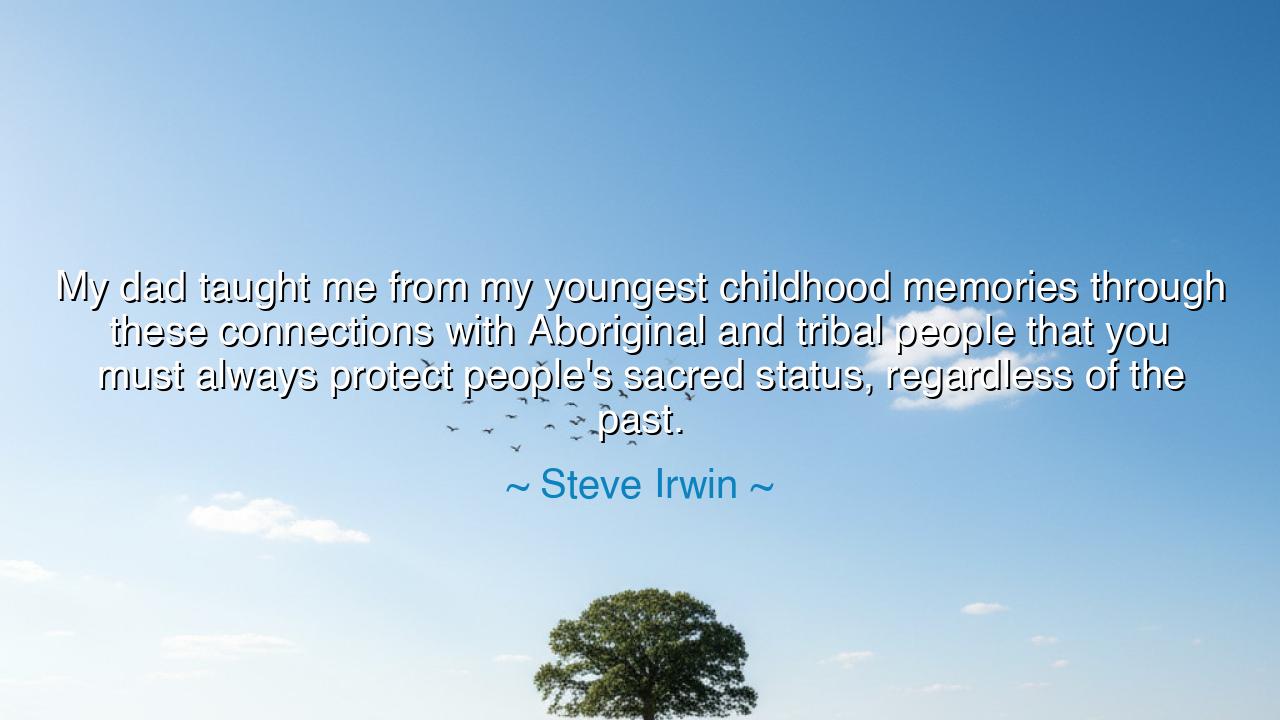
My dad taught me from my youngest childhood memories through
My dad taught me from my youngest childhood memories through these connections with Aboriginal and tribal people that you must always protect people's sacred status, regardless of the past.






The words “My dad taught me from my youngest childhood memories through these connections with Aboriginal and tribal people that you must always protect people's sacred status, regardless of the past,” spoken by Steve Irwin, are a declaration of reverence — not merely for people, but for the ancient spirit of humanity itself. Within them lies the wisdom of a man who saw the world not as a hierarchy of worth, but as a living web of connection. His father, Bob Irwin, a man of the land and a student of nature’s quiet truths, passed to his son the sacred law of respect: that every being — human, animal, or land itself — carries a sacred status that must never be desecrated, even when history has been cruel. In these words, Steve Irwin speaks not as a mere naturalist, but as a keeper of an ancient principle — the same one that guided elders, warriors, and shamans since the dawn of time: honor the sacredness of life, and defend it without prejudice.
To protect people’s sacred status is to recognize the divine spark within every soul, regardless of its place in history. The Aboriginal and tribal peoples of the world have long lived in harmony with this truth — they see themselves not as rulers of the Earth, but as its custodians. From his youth, Steve walked among such wisdom-keepers and absorbed their reverence for life. His father’s teaching was not an abstract philosophy, but a way of living: to look into the eyes of another person or creature and see something eternal reflected back. “Regardless of the past,” his father told him — meaning that the mistakes, wounds, or divisions of history cannot erase the sacred dignity of those who carry the light of humanity. In those words lies an echo of an ancient creed: forgiveness and reverence are stronger than pride or revenge.
The ancients would have recognized this teaching as the heart of all civilization. The Egyptian Ma’at, goddess of truth and balance, demanded that kings and peasants alike honor the sacred order of life. The Greek Stoics taught that all men share a divine reason — that none are born lesser, for all participate in the same universal soul. And the Aboriginal peoples of Australia, whom Irwin revered, carry a belief called “Tjukurpa”, or the Dreaming — the understanding that all life, all time, and all beings are woven into a single, sacred story. Steve Irwin’s father, in teaching his son to protect this sacredness, was passing down not a rule, but an inheritance of moral vision — a way of seeing the world where reverence replaces domination, and compassion becomes the measure of greatness.
Irwin lived this principle not only toward people, but toward the creatures of the earth. He understood that respect for one life extends to all life. The same reverence he showed to Aboriginal elders, he extended to the crocodile and the snake — animals feared and misunderstood by many. He treated them not as enemies or trophies, but as sacred beings, ancient and wise in their own right. His empathy was not selective; it was universal. In this, he reflected the truest essence of his father’s lesson: that to honor the sacred in another, you must first see it everywhere — in the earth beneath your feet, in the people history has wronged, and in the animals that share your breath. This worldview is not modern, nor primitive; it is eternal, the language of the soul that remembers its kinship with all creation.
History, too, is filled with those who understood this sacred duty. Consider Mahatma Gandhi, who taught that the strength of a nation is measured not by its wealth or armies, but by how it treats the weakest among its people. He saw dignity as a divine birthright that no injustice could erase. Or recall Nelson Mandela, who, after decades of imprisonment, emerged not with hatred but with mercy — understanding that reconciliation, not vengeance, was the only path to restore the sacred humanity of his people and their oppressors alike. These are the same truths that Irwin lived by, though his arena was the wild, and his sermons were given beneath the open sky. To protect sacred status, regardless of the past, is to practice compassion without condition.
There is in Irwin’s words a challenge to the modern soul. In a world obsessed with blame and division, where history is often used to separate rather than unite, he reminds us that sacredness is not something one earns — it is something one carries by virtue of being alive. To protect it is to rise above bitterness and to heal the wounds of time through respect and understanding. It means to see the divine not only in those who share our story, but in those whose story differs from ours — in the old, the forgotten, the indigenous, the outcast. Such protection requires humility, for it demands that we see ourselves not as judges, but as guardians.
Thus, the lesson of Irwin’s quote is clear: reverence is the path to harmony. If we wish to live rightly upon this earth, we must learn to honor the sacred in every form it takes — human or animal, ancient or modern, friend or stranger. Let us follow his example: speak gently, act bravely, and protect with love. Let the past instruct us, but never harden us. For only when we protect the sacredness of others do we affirm the sacredness within ourselves. As Irwin’s life so powerfully showed, to protect life — in all its forms — is the highest expression of what it means to be human.






AAdministratorAdministrator
Welcome, honored guests. Please leave a comment, we will respond soon